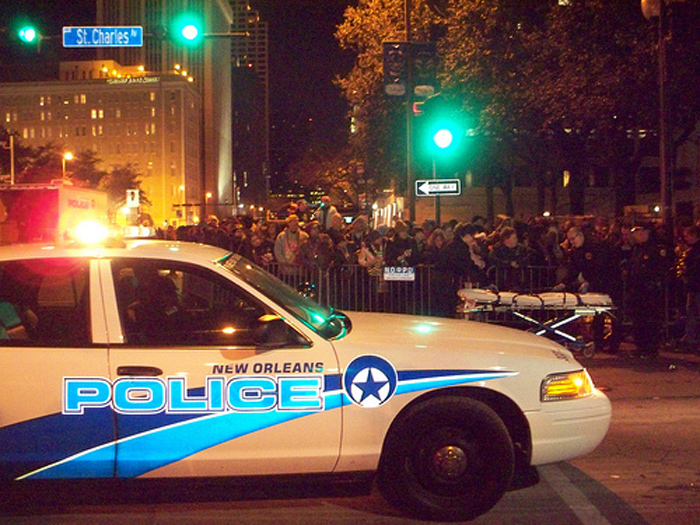The federal criminal investigation of the police shootings of civilians on Danziger Bridge in post-Katrina New Orleans is just part of what the Justice Department acknowledges is an intensive review of the city’s notorious police department. One option under review, TPMmuckraker has learned, is filing a civil rights lawsuit against the city in a move similar to the one the Justice Department took against the Los Angeles Police Department a decade ago.
“Criminal prosecutions alone, I have learned, are not enough to change the culture of a police department,” Assistant Attorney General for Civil Rights Thomas Perez told TPMmuckraker in an interview Monday.
Perez repeatedly emphasized that the Civil Rights Division plans on being in New Orleans for the long haul. “We have a robust and regular presence, a presence that’s getting larger by the week,” Perez said, adding that several civil rights staffers are “de facto living in New Orleans right now.”
Since late February, three former New Orleans police officers have pleaded guilty to charges connected with the cover-up of the Danziger Bridge shootings, in which police allegedly shot six unarmed civilians, killing two, in the chaotic days after Hurricane Katrina swept through the city.
In the interview, Perez said he believes the city’s police department is “one of the most troubled in the country” — and that the Civil Rights Division is looking at “every conceivable jurisdictional option and every conceivable intervention” for reform.
The DOJ has the authority — granted by Congress a few years after the 1991 Rodney King police brutality case — to bring a civil action to force reform at the department if there is a “pattern or practice” of police violating the law or the Constitution.
So-called 14141 actions, named after the relevant section of the law, fell out of the favor during the Bush years, when enforcement of civil rights laws languished across the board. Attorney General Eric Holder has pledged to recharge the Civil Rights Division.
“The attorney general, myself, the U.S. attorney — we will not leave the New Orleans Police Department until we have addressed the systemic issues and have ensured that the department is operating in a manner that reduces crime and respects the rule of law,” Perez said. “We can, must, and will do both.”

William Yeomans, a fellow at American University College of Law and former acting assistant AG for civil rights, tells TPMmuckraker in an interview that the Justice Department’s action so far “suggests that they’re considering a 14141 situation or they’re starting an investigation, which seems like an almost unavoidable step considering what’s going on.”
If the department took that step, “they would draft a lengthy letter and invite the jurisdiction to sit down and negotiate a resolution. In the background of course would be the threat of a lawsuit,” Yeomans says. Among the remedies available to the Justice Department, according to Yeomans, “would be a restructuring of management, new policies, more resources toward whatever the problem areas are.”
In a landmark deal in 2000, the Civil Rights Division entered into a consent decree with Los Angeles to allow an independent monitor for its police department and to create a number of policies to curb brutality and other internal problems.
Federal authorities reportedly have at least eight active civil rights investigations in New Orleans, with most involving killing of civilians by police, according to the Times-Picayune.
Perhaps the most grisly of the lot is the Danziger Bridge episode that occurred in early September 2005 and left two unarmed civilians dead and four others seriously wounded. Ronald Madison, a severely mentally disabled 40-year-old, was shot multiple times in the back, and James Brissette, 19, was shot seven times while headed to get supplies at a supermarket.
Gruesome new details emerged last week when former Officer Michael Hunter, who admitted to shooting at civilians, pleaded guilty to obstruction of justice charges.
According to Hunter’s new account of events, after an initial round of shooting, a police sergeant “suddenly leaned over the concrete barrier, held out his assault rifle, and, in a sweeping motion, fired repeatedly at the civilians lying wounded on the ground.” The civilians at the time “appeared to be unarmed, injured, and subdued.”
An elaborate and wide-ranging cover-up followed the shootings, with police planting a gun at the scene and claiming they had been shot at.
For Perez, who traveled to New Orleans late last month to meet with the chief of police and community leaders, there’s a sense of deja vu surrounding all of this. A career prosecutor, he worked on the 1994 case against New Orleans police officer Len Davis, who was convicted for ordering the murder of a woman who had filed a brutality complaint against him.
“Regrettably, many of the challenges we’re seeing in the Danziger Bridge case — I wish I could say these are problems of recent vintage, but we have had a longstanding presence in New Orleans,” Perez says. “The police department has generated a consistent and steady amount of work for the Civil Rights Division.”






